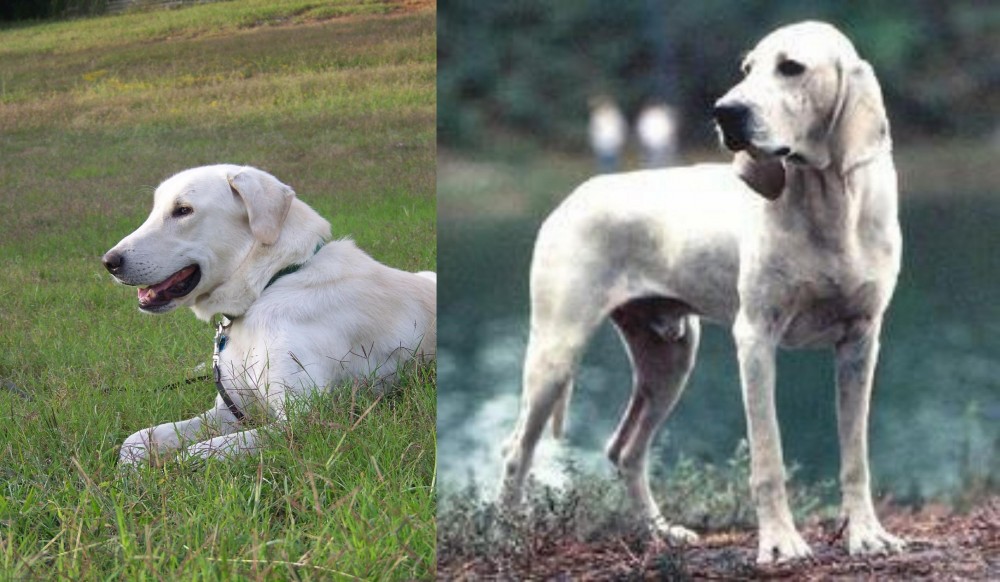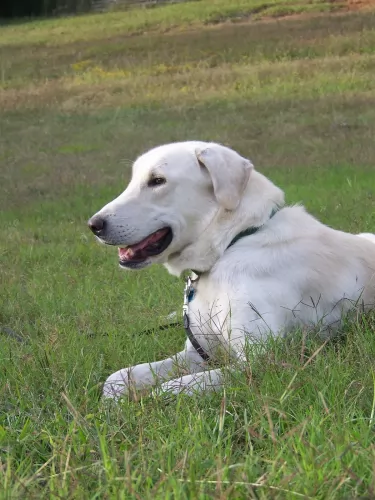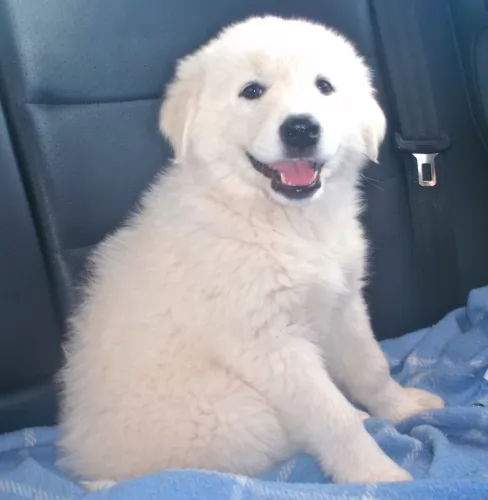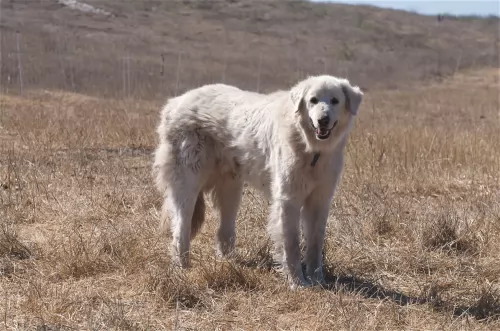 Petzlover
Petzlover Akbash Dog is originated from Turkey but Porcelaine is originated from France. Akbash Dog may grow 26 cm / 11 inches higher than Porcelaine. Akbash Dog may weigh 37 kg / 82 pounds more than Porcelaine. Akbash Dog may live 3 years less than Porcelaine. Akbash Dog may have more litter size than Porcelaine. Akbash Dog requires Moderate Maintenance. But Porcelaine requires Low Maintenance
Akbash Dog is originated from Turkey but Porcelaine is originated from France. Akbash Dog may grow 26 cm / 11 inches higher than Porcelaine. Akbash Dog may weigh 37 kg / 82 pounds more than Porcelaine. Akbash Dog may live 3 years less than Porcelaine. Akbash Dog may have more litter size than Porcelaine. Akbash Dog requires Moderate Maintenance. But Porcelaine requires Low Maintenance
 Akbash breed became popular in the 1970s. Around that period, Akbash was introduced to North America. There is archeological evidence that this breed was popular even in the 750-300 BC. Of course, it wasn’t the exact dog as we know it today, but there are many similarities between Akbash and dog from the ancient period. This breed was developed in Turkey to be a guardian dog. They were perfect flock guardians.
Akbash breed became popular in the 1970s. Around that period, Akbash was introduced to North America. There is archeological evidence that this breed was popular even in the 750-300 BC. Of course, it wasn’t the exact dog as we know it today, but there are many similarities between Akbash and dog from the ancient period. This breed was developed in Turkey to be a guardian dog. They were perfect flock guardians.
 The Porcelaine is an attractive dog hailing from France. It is thought to be the oldest of the French scent hounds.
The Porcelaine is an attractive dog hailing from France. It is thought to be the oldest of the French scent hounds.
The dog also goes by the name of Chien de Franche-Comté. The dogs were developed for hunting purposes. It is believed to be an ancient dog breed, dating way back to the 1700s.
It is thought that dogs used to bring about the Porcelain are the Talbot Hound, the English Harrier, the Montaimboeuf, as well as some smaller Laufhunds of Switzerland.
The Club du Porcelaine was established in France in 1971 and the breed was recognized by the FCI in 1975. It is a rare breed virtually unknown outside of France.
 Weight of the Akbash dog variates from 41-64kg, while their height is 71-78cm. Female Akbash is smaller than a male Akbash, but not for much.
A lifespan of an average Akbash dog is 10-11 years, but if they have cared properly, they tend to live longer.
Litter Size of Akbash is 8-9 puppies.
Another Name for Akbash is Akbas Coban Kopegi, Coban Kopegi.
Weight of the Akbash dog variates from 41-64kg, while their height is 71-78cm. Female Akbash is smaller than a male Akbash, but not for much.
A lifespan of an average Akbash dog is 10-11 years, but if they have cared properly, they tend to live longer.
Litter Size of Akbash is 8-9 puppies.
Another Name for Akbash is Akbas Coban Kopegi, Coban Kopegi.
 The Porcelaine has got such a gentle, amicable face that he looks like he wouldn’t hurt a fly.
The Porcelaine has got such a gentle, amicable face that he looks like he wouldn’t hurt a fly.
His interesting name comes from the fact that he has a shiny, gleaming single coat that looks like white porcelain.
He has a distinguished look to him with his slender neck, slender head with longish muzzle. The body is well proportioned, lean and muscular. Another noticeable feature of this dog is the long, floppy ears which can have a hint of orange. His nose is black and he has dark eyes and a long tail. He is a medium sized dog standing at between 53 to 58cm in height and weighs about 25 to 28kg.
Elegant and beautiful, the Porcelaine isn’t your usual looking dog. He is amicable and easy-going and always ready for a pat on the silky head.
His temperament, kindly and easy going, makes him the perfect pet for therapy purposes and for search and rescue work. He is a quiet, well behaved dog, indoors and out. He is an energetic dog and loves nothing more than a hunt and he has a keen sense of smell.
He loves being outdoors but is such a good friend of yours he can happily turn into a couch potato to be by your side.
 Have in mind that Akbash is a large and powerful dog. They are bred through generations to be guardians and suspicious. They are very independent because they tend to make their own decisions while guarding flocks. They will require adequate socialization, but overall, they are very intelligent and they tend to learn quickly. It requires time and patience, but are great pets for right owners. Akbash has a white to biscuit color coat. They also have a dark pigment around nose, eyes, and mouth. Akbash is very quick and agile dog, which might be surprised because of its size.
Have in mind that Akbash is a large and powerful dog. They are bred through generations to be guardians and suspicious. They are very independent because they tend to make their own decisions while guarding flocks. They will require adequate socialization, but overall, they are very intelligent and they tend to learn quickly. It requires time and patience, but are great pets for right owners. Akbash has a white to biscuit color coat. They also have a dark pigment around nose, eyes, and mouth. Akbash is very quick and agile dog, which might be surprised because of its size.
It is important to train them since the puppyhood. They are working dogs and they will be happy when they have tasks during training. Due to their independence, consistent and steady training is important. An old-fashioned way of training that includes punishment is not recommendable. Positive training with awards is the best way to train your Akbash dog. They do not require a lot of daily exercises. Daily walks would do more than enough. Younger dogs need more exercise than more mature ones. They can be very good for other animals, but they have to be socialized with them. It is the best way to socialize your dog when it is still a puppy.
 The Porcelaine is a working, hunting dog but he is more than willing to become a companion animal, being loving and loyal to his human family.
The Porcelaine is a working, hunting dog but he is more than willing to become a companion animal, being loving and loyal to his human family.
He is a balanced, kind natured dog and can get on well with children and with pets in the home.
He enjoys his human family, and typical of hounds he is friendly, energetic and amusing. Bring this beautiful white dog into your home and start a wonderful, long, loving friendship with him.
 The Porcelaine has so many good features, and good health is one. He is described as a truly healthy breed that can easily reach up to 14 years of age with good care.
The Porcelaine has so many good features, and good health is one. He is described as a truly healthy breed that can easily reach up to 14 years of age with good care.
As a Porcelaine owner, look out for some of the more common heath conditions such as cancer, bloat and skin infections.
A working, hunting type dog such as the Porcelaine can be devastated with hip dysplasia. It’s a disease that can be genetically passed on and if your dog has it,it should be spayed or neutered. The condition, where your pet becomes more and more reluctant to participate in exercise can be painful and debilitating.
There are different treatments available for pain relief and mobility.
The long, floppy ears of the Porcelaine can result in a tendency towards ear infections. Ear infections can be painful and frustrating and you’ll see your dog scratching his ears and shaking his head. The ears may be red inside and there may even be a discharge. Don’t allow your pet to suffer and get him to the vet.
 Akbash dog is very easy to care. They can stay fit on a minimum amount of food. 2-2.5 cups divided into two meals would be ideal for your dog. They require meat, so giving them dry industrial food can be a solid substitute. Vegetables and oil can also be included in meals. It will keep your dog healthy and happy.
Akbash dog is very easy to care. They can stay fit on a minimum amount of food. 2-2.5 cups divided into two meals would be ideal for your dog. They require meat, so giving them dry industrial food can be a solid substitute. Vegetables and oil can also be included in meals. It will keep your dog healthy and happy.
Puppies have to eat more meals per day. It is the best to give your puppy Akbash 3-5 meals per day. Those meals should be divided into smaller portions. It is recommended to give your puppy all necessary vitamins and minerals that include calcium for stronger bones. It will improve the overall health of your dog, and it will help it develop into a healthy adult dog.
Akbash will request some grooming, but they are not very difficult to groom. They require regular grooming. Every few days will be enough, except when they are shedding. Akbash will need daily grooming when shed. You can bath your pet occasionally, but not very often. Bathing, if necessary, should be done only 5-6 times a year. There is no need for more.
 Porcelaines have a very high activity level and require lots of exercise - ball games and walks. Because of this, they aren't recommended for people living in small homes in the city. He will ideally suit life on a big property.
Porcelaines have a very high activity level and require lots of exercise - ball games and walks. Because of this, they aren't recommended for people living in small homes in the city. He will ideally suit life on a big property.
The Porcelaine Dog is a single coated dog with very short hair and is looked upon as being pretty low maintenance.
Apart from brushing him twice a week, to keep the coat shiny and healthy, wipe him down with a hound mitt to get rid of loose hairs and to remove dust.
Because of the long, floppy ears, clean the insides very gently to avoid dirt, moisture and wax buildup. There are veterinarian-recommended ear cleansers, but if you don’t like the idea of doing it yourself, the vet or groomer will do it for you when you take him to have his nails clipped.
Your beautiful Porcelaine dog needs the very best food there is so as to ensure he remains the healthy, shiny, lean specimen he is.
He can live a long, healthy life if you choose quality dog food packed with the right mix of vitamins and minerals. If you buy commercially manufactured dog food for him, it needs to be the high quality ones to ensure its properly formulated.
Your Porcelaine, like any other dog, wants consistency and simplicity. Home-made food is always an excellent choice for your pet’s diet. Boiled chicken, brown rice or pasta and spinach, sweet potatoes and carrots can be very healthy for him.
Chop it up and add it into the dry kibble a couple of times a week. Its providing him with some variety from the dry kibble and gives him a tasty treat.
Some raw meat added in occasionally will also ensure his coat and eyes remain bright and vibrant. Always make sure he has access to fresh, cool water.